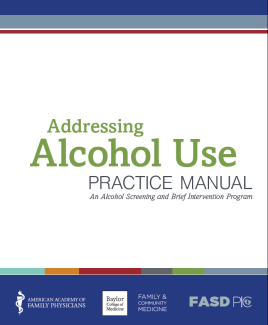Addressing Alcohol Use Practice Manual

Risky alcohol use, defined as any level of alcohol consumption which increases the risk of harm to oneself or others, is both a substance use disorder and medical issue. Recognized as one of the leading preventable causes of death, risky alcohol use leads to over 88,000 deaths each year in the United States. Among adults in the U.S., approximately 58% of men and 46% of women report drinking in the last 30 days. National estimates also indicate that greater than 50% of the alcohol consumed by adults is during binge drinking, the most common pattern of excessive or risky alcohol use. More specifically, in the U.S., approximately 23% of adult men report binge drinking five times per month, while 11% of adult women report binge drinking three times per month. Furthermore, research indicates that more than one in two women of childbearing age drink alcohol. Among those that drink alcohol, 18% engage in binge drinking.
Family physicians and other primary care providers are in an ideal position to facilitate the prevention of morbidity and mortality associated with risky alcohol use. Many professional organizations recognize the importance of screening and behavioral counseling interventions to reduce alcohol misuse, including the American Academy of Family Physicians (AAFP), American College of Obstetricians and Gynecologists (ACOG), and the U.S. Preventive Services Task Force (USPSTF).
Alcohol screening and brief intervention (SBI) is a USPSTF grade B recommendation that includes:
- Screening all adult primary care patients for risky alcohol use, at least yearly, using an evidence-based screening tool.
- Providing a brief behavioral intervention to patients screening positive for risky alcohol use, to help them make healthier choices around their drinking (e.g. to reduce alcohol use or quit drinking).
This practice manual provides a systems-change approach for implementing alcohol SBI into your practice.
